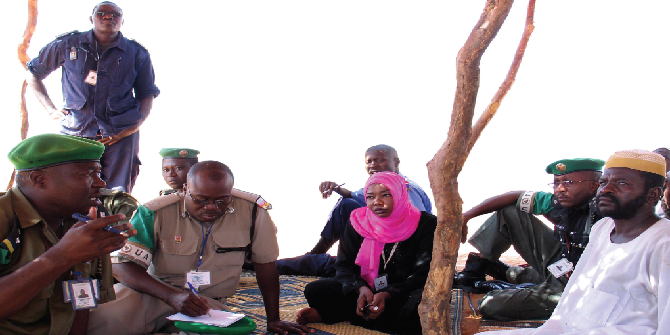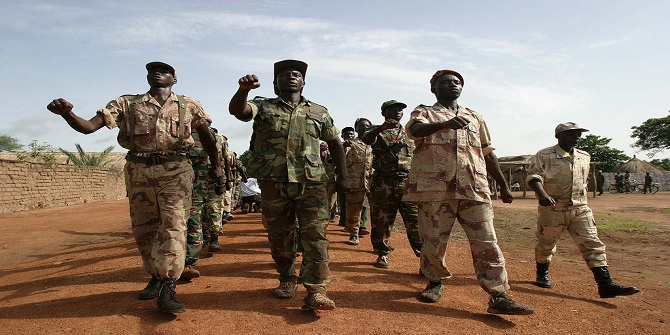Tom Kirk, Robin Luckham and Tatiana Carayannis draw on the JSRP’s research to argue that calls for a reinvigorated effort to tackle the root causes of conflict and insecurity require closer attention to the political meaning of ‘security’ and ‘conflict resolution’ across different contexts.
Much has been made of the British government’s controversial – and as of 2015 legally binding – commitment to spend 0.7% of Gross National Income (GNI) on Overseas Development Assistance (ODA). Yet, as austerity has become the buzzword domestically, many are beginning to scrutinise how this money is spent and some have even suggested that funds should be diverted to other causes.
At the same time, however, the misery of ongoing conflicts in the Middle East and Africa is being brought to European shores in the form of greatly expanded numbers of refugees. Fearful for their lives and futures, entire families and communities daily make dangerous journeys to countries they hope will provide them with safety. This has led to fierce disagreements in the states receiving them and the near paralysis of multilateral and regional institutions struggling to coordinate their responses – both of which feed into a general European shift towards anti-immigration and isolationist politics, echoed across the Atlantic, in the United States.
Seeking to show that its aid budget can be made to work in the national interest, the British government has committed itself to tackling the ‘root causes’ of these conflicts. This includes devoting around 50% of the Department for International Development’s (DfID) funds to what are termed ‘failed’ and ‘fragile’ states, the establishment of a new crisis reserve fund, and an expanded conflict, stability and security fund. It appears the overarching goal is to create the conditions in the places from which refugees are fleeing that will stem their flow to Europe and, by extension, Britain.
We argue, however, that any serious effort to address the causes of seemingly intractable conflicts and insecurity must first ask why mainstream ways of understanding and crafting policy responses seem to have enjoyed little success to date. Indeed, the JSRP began its work with the suspicion that the tendency to view (in)security largely through the prism of state or multilateral actors, is a major reason why development interventions, security sector reform programmes and conflict resolution efforts so often seem to have little impact. To test this hypothesis, we carried out systematic evidence reviews of the literature on everyday security arrangements and conflict resolution in conflict-affected states.
Broadly viewed, the reviews revealed a lack of robust research on security provision from the perspective of those being secured or of the political meanings of ‘security’ in conflict-affected places. Indeed, mainstream understandings of security provision appear wedded to state-centric concerns, with primacy given to political stabilization, state building, border protection and the effectiveness of state security apparatuses.
This was particularly surprising given that much of the wider conflict research literature increasingly conceptualises contemporary conflicts as simultaneously occurring within intricate local histories and within processes of globalisation. Moreover, it shows that in many cases predatory states built on war economies are themselves driving or sustaining insecurity. This prompted us to conclude that the ‘breadth, depth, and quality of evidence-based research on which interventions impact positively, or negatively, on the end-user who is negotiating her/his everyday life under hybrid governance arrangements is particularly inadequate’.
To address these evidence gaps we argued that research and policy in conflict-affected or fragile states should focus on the varying ways in which security provision and attempts at conflict resolution are provided by multiple actors, often in competition, and often through claims of statehood, with elements both of coercion and compliance. These can include state and non-state authorities, such as rebel groups, militias or largely autonomous police and military units, and, in some cases, intervening international forces such as the US- coalition in Afghanistan or the various United Nations peace operations in parts of Africa. Furthermore, it should be recognised that these actors may themselves be embedded in wider, sometimes transnational, networks that link them to the interests of individual powerbrokers, criminal organisations, central and neighbouring governments, or allied states.
At the same time, security provision and conflict resolution are often bound up with these actors, networks, institutions and alliances’ attempts to establish themselves as legitimate public authorities. By this, we suggest that security cannot simply be understood as a status or condition. Rather, its provision should be seen as a political act contributing to one or another actor’s or group’s claim to power and authority; whilst denying their opponents livelihoods, opportunities, freedoms and rights. Indeed, security provision and conflict resolution are often part of attempts to author or maintain identities and boundaries, and to create insiders and outsiders.
It is in this sense that we suggest that security provision, including conflict resolution initiatives, should be seen from both their supply and demand sides. The first, supply-side, view suggests that both are processes ‘of political and social ordering, established and maintained through authoritative discourses and practises of power, including but not confined to organised force.’ Whilst the demand-side view depicts peace and security as ‘an entitlement of citizens and more widely human beings to protection from violence and other existential risks including their capacity in practice to exercise this entitlement.’
Such understandings require that security is understood from the perspectives of both those doing the securing, including their wider interests and goals, and the people supposedly being secured, including their ability to have a say in how this happens. It is hoped that such a dualistic perspective will reveal how security provision and conflict resolution are central to processes of establishing legitimate public authorities, maintaining in and out groups, and authoring more or less stable polities.
As the JSRP’s director Mary Kaldor has recently argued alongside Javier Solana, within many contemporary conflicts there are zones of stability and security, and even areas in which local powerholders, sometimes in collaboration with, and sometimes in spite of, the state, provide basic services. For example, large parts of western Libya are relatively safe due to a patchwork of local ceasefires and agreements. Although themselves fragile, a demand and supply side view of security and conflict resolution may help analysts learn lessons as to how these zones are negotiated, who has voice in such agreements, and where they may lead. Furthermore, it may help outsiders uncover opportunities to support and widen such zones. And finally, it helps moves us away from thinking about resolving armed conflict, and instead focuses us on reducing violence.
Indeed, the JSRP’s research suggests there is a growing need for us to conceptualize violence as a distinct phenomenon from conflict or war. For example, in the DRC, as in many protracted ‘conflicts’, the 80+ armed groups presently in operation are not fighting a war. Rather, they’re extortion or protection rackets, rent-seeking operations, and so forth, and their combined activity generates enormous insecurity for the populations caught in their spheres of influence. Nonetheless, given its point of departure in the conditions for peace as opposed to the conditions of conflict, the new SDGs, particularly SDG 16, offer us a potentially new entry point to build secure and inclusive societies, and to reduce violence in such places.
As argued, first and foremost, this requires recognising the diverse range of actors that can be involved in the creation of zones of (in)security, and that each brings their own interests and claims to public authority to the table. Evidence from the JSRP’s research suggests that efforts to extend state authority in such settings can merely fuel the competition for authority or create multi-layered governance systems. Indeed, donors have to be careful that they do not just add to the multiplicity of justice and security actors only to exacerbate the real problem of forum shopping in such places. Only by understanding their relationships and networks, both with local communities and external patrons, can they begin to uncover the complex, underlying causes of seemingly intractable conflicts and organise to work with those seeking to address them.
Please see here for the JSRP’s Security and Conflict Resolution Evidence Papers that informed this post.
Tom Kirk is the JSRP’s Online Editor and a PHD candidate at the London School of Economics and Political Science. Tatiana Carayannis is a Research Director of the JSRP and deputy director of the Social Science Research Council’s Conflict Prevention and Peace Forum where she leads on the CPPF’s Africa programmes. Dr Robin Luckham is a political sociologist with over 50 years professional experience, more than 40 at IDS. He began his academic career in Nigeria and Ghana, and has also worked in the USA and Australia.
Photo credit: US Army Africa via Foter.com / CC BY
Note: This article gives the views of the author, and not the position of the Justice and Security Research Programme, nor of the London School of Economics.






1 Comments